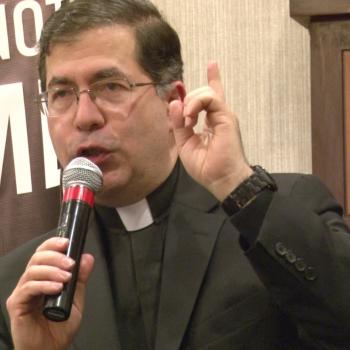
I have a confession to make: I’ve never done a proper job interview. True, there was my video-meeting with Patheos about signing on as a Featured Writer. That wasn’t really the same thing. Outside this gig, I’m self-employed as a piano teacher. I didn’t see the point in interviewing myself.
Acts 1:15-26 tell us about one of history’s most important recruitment exercises: the selection of an apostle. Judas has flushed his career down the drain by turning on the boss, and so Christian HQ has declared a vacancy. Help wanted in the Apostle Department. It’s vital they find someone else pronto, because there’s important work ahead.
Setting the scene for us, Luke – the author of Acts – gives us moderns a sense of the bewildering scale by which Christianity has grown over the two millennia since he put pen to paper. Christianity claimed only 120 followers – or thereabouts – in the days of Acts 1 (v. 15). Judging by this progress, they chose the right man for the job when co-opting a new apostle!
Coming immediately before this canny co-option, we might regard Acts 1:16-22 as the first papal address. We know St. Peter was the Church’s inaugural pope, and this is his debut speech to the believers. It isn’t as grand as a balcony discourse by Francis from St. Peter’s Basilica – that iconic edifice in the Vatican – but it’s a papal address all the same.
In his mini-sermon, Peter summarizes the tragic events of Good Friday, the Passion of Our Lord. As painful as the memories are for Peter, no doubt, Easter is important as contextual information for the selection process to come. His Holiness reminds the faithful how Judas fell from grace; he’s making sure that everyone is up to speed on all that has happened.
In so doing, he posits what is later codified at Nicaea to be one of our central doctrines: the Holy Spirit speaks through the Prophets. ‘Friends, the scripture had to be fulfilled, which the Holy Spirit through David foretold concerning Judas, who became a guide for those who arrested Jesus’ (v. 16).
Peter underlines the sting of Judas’s betrayal in v. 17, ‘for he was numbered among us and was allotted his share in this ministry.’ Judas wasn’t simply playing along with being a disciple to further an ulterior motive. Not initially, for sure. Until his heart yielded to the devil, he loved Our Lord as a brother. Until we realize this, it’s easy to miss how far Judas fell.
Speaking of Judas falling, Luke then gives us a gory description of Judas’s death after he spent his ill-gotten silver. ‘Now this man acquired a field with the reward of his wickedness; and falling headlong, he burst open in the middle and all his bowels gushed out’ (v. 18). Boak.
I must wonder if urban legends about Judas’s field sprang up in Jerusalem after these events. It was widely known in the city how Judas died: ‘This became known to all the residents of Jerusalem, so that the field was called in their language Hakeldama, that is, Field of Blood’ (v. 19). With a name like that, Hakeldama wouldn’t feel out of place in Stephen King’s Pet Sematary, playing the part of a ghostly graveyard.
Was Hakeldama somewhere every Palestinian parent warned their children to stay well away from? Did every ten-year-old in Jerusalem show their mettle by venturing to the spot where Ol’ Judas fell? How many kids in the city woke in the night with terrors of a certain disciple in pursuit, intestines trailing the ground as he lumbered after them?
It’s creepy stuff, although more cheerful business calls. Peter uses verses from the Psalms to transition elegantly from narrating Judas’s death to starting on the matter at hand: electing a replacement apostle. Taking Psalm 109:8 as a reference to Judas, Peter declares, in v. 20, ‘Let another take his position of overseer.’ But it isn’t a first come, first served situation; an orderly procedure will determine the successor to Judas.
Firstly, there are criteria for who can stand in this election. Unfortunately, the apostolate wasn’t open to women. Thankfully, however, many parts of the Anglican Communion are now happy to consecrate female bishops as the modern-day heirs to the apostles. It’s only men who had observed all of Jesus’s earthly ministry who can step forward for the role (v. 21).
And what are the parameters of Jesus’s pastoral work among us? ‘beginning from the baptism of John until the day when he was taken up from us’ (v. 22a). That’s reasonable. There doesn’t appear to be gerrymandering – nobody locked out of running because they didn’t see some obscure episode in Jesus’s childhood. It’s a fair election with rules known beforehand.
An apostle must also bear witness to Christ’s resurrection (v. 22b). But apostleship is an ecclesiastical role as well as an evangelical one. The twelve apostles, and the bishops who came after, are those who safeguard the message of the Church and ensure that we, the people of God, remain true to the faith once received.
So then, it’s time, in v. 23, to meet our candidates for the twelfth apostle: Barsabbas and Matthias. In the best western political tradition, it’s come down to two contenders. I like to think, however, when I picture the proceedings, that selecting an apostle was less rambunctious than picking an American president!
As ever, John Calvin’s gloss on this verse is interesting: ‘when the apostles were desirous to substitute another in the place of Judas, they did not venture to nominate any one certainly,’ writes the reformer, ‘but brought forward two, that the Lord might declare by lot which of them he wished to succeed’ (Institutes, 4.3.13). In other words, the nomination of two candidates revealed a certain humility from the remaining eleven apostles.
Which is the best way, then, to decide on an apostle? Is there a cross-examination by St. Peter? an essay competition? Well… no. They draw lots (v. 26); after having prayed, of course (v. 24). Now, to the modern reader casting lots – basically throwing dice – feels more like a move in a casual game of Monopoly than a credible way to pick an apostolic luminary. But it’s a practice with a pedigree from scripture.
Matters as grave as finding out a guilty party (1 Samuel 14:42; Jonah 1:7), or as consequential as apportioning land (Numbers 26:55; Joshua 18:6), were settled in Ancient Israel by throwing lots. The name for such a practice is cleromancy, which sounds like something Harry Potter would find on his Hogwarts timetable. Nevertheless, cleromancy was how the Jewish people operated!
After giving the lots a good shake and a throw, Matthias emerges as the man of the hour. There is a sense of order being restored in v. 26 as eleven become twelve once again. Personnel shortages addressed, it’s now time for the great adventures of Acts to begin – starting with Pentecost, when the Holy Spirit will arrive.
And what are we to do with all this talk of apostles? ‘We believe in one holy catholic and apostolic church.’ In the teachings which Mattias and all the other apostles proclaimed, we find a message which unites every Christian – a Gospel which is the Church’s to defend until the conclusion of earthly time.
As a seldom-sung verse of an often-sung hymn beckons, ‘Lo! the Apostolic train. Join the sacred name to hallow.’ This is an invitation to stop and hear what apostles of ages past are saying in scripture and honor the news they bring. Whenever we gather as disciples of St. Peter and all Our Lord’s apostles, we do just exactly this. We turn our eyes upwards as we worship, adding our voices to theirs in thankful praise to God.
6/10/2022 6:45:34 PM





